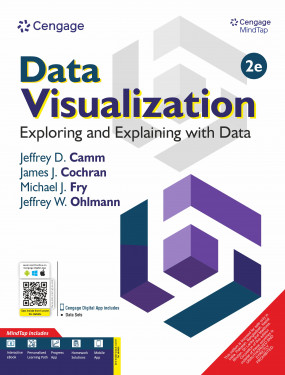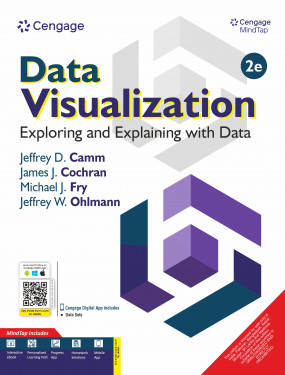For over 30 years, this text has provided students with the information they need to understand and apply multivariate data analysis. The eighth edition of Multivariate Data Analysis provides an updated perspective on the analysis of all types of data as well as introducing some new perspectives and techniques that are foundational in today’s world of analytics. Multivariate Data Analysis serves as the perfect companion for graduate and postgraduate students undertaking statistical analysis for business degrees, providing an application-oriented introduction to multivariate analysis for the non-statistician. By reducing heavy statistical research into fundamental concepts, the text explains to students how to understand and make use of the results of specific statistical techniques.
- Unique “Rule of Thumb” feature helps students learn how to best use different techniques.
- Assumes that students will come from a business, rather than mathematics, background. The authors use non-complex language to make complex techniques accessible.
- Provides an application-oriented introduction to multivariate analysis for the non-statistician.
- Aimed at students taking postgraduate and high-level graduate degrees across all the business areas.
- New chapter on partial least squares structural equation modeling (PLS-SEM), an emerging technique which can be applied by researchers in both the academic and business domains.
- Each chapter highlights the implications of Big Data, underlining the role of multivariate data analysis in this new era of analytics.
- Extended discussions of emerging topics, including causal treatments/inference (i.e. causal analysis of non-experimental data as well as propensity score models) along with multi-level and panel data models (extending regression into new research areas and providing a framework for cross-sectional/time-series analysis).
- Each chapter has been updated to reflect technical improvements, (for example adding material on multiple imputation for missing data treatments, and the merging of basic principles from the fields of data mining and its applications).
- The chapters on SEM have been updated to include: greater emphasis on psychometrics and scale development, discussions on the use of reflective versus formative scaling, an alternative approach for handing interactions (orthogonal moderators), higher order models, multi-group analyses, Bayesian SEM, and revised information on software availability (e.g. Lavaan and SmartPLS). The multi-group discussion also includes an alternative to partial metric invariance when cross-group variance problems are small.
- Online resources for researchers including continued coverage from past editions of all of the analyses from the latest versions of both SAS and SPSS (commands and outputs).
Chapter 1 Overview of Multivariate Methods
Section 1: Preparing for Multivariate Analysis
Chapter 2: Examining Your Data
Section 2: Interdependence Techniques
Chapter 3: Exploratory Factor Analysis
Chapter 4: Cluster Analysis
Section 3: Dependence Techniques
Chapter 5: Multiple Regression
Chapter 6: MANOVA: Extending ANOVA
Chapter 7: Discriminant Analysis
Chapter 8: Logistic Regression: Regression with a Binary Dependent Variable
Section 4: Moving Beyond the Basic Techniques
Chapter 9: Structural Equation Modeling: An Introduction
Chapter 10: Confirmatory Factor Analysis
Chapter 11: Testing Structural Equation Models
Chapter 12: Advanced Topics in SEM
Chapter 13: Partial Least Squares Modeling (PLS-SEM)
In addition to the chapters in the print book, e-copies of all other chapters in the previous editions are available to download on the companion website, including canonical correlation, conjoint analysis, multidimensional scaling, and correspondence analysis.
Joseph F Hair, University of South Alabama
Joseph F. Hair, Jr. is Cleverdon Chair of Business at University of South Alabama, USA. He previously held the Copeland Endowed Chair of Entrepreneurship and was Director of the Entrepreneurship Institute at the E.J. Ourso College of Business, Louisiana State University. He was a United States Steel Foundation Fellow at the University of Florida, Gainesville, where he earned his Ph.D. in Marketing. He has authored over 40 books and has published numerous articles in professional journals. He is a Distinguished Fellow of the Academy of Marketing Sciences, the Society for Marketing Advances, and the Southwestern Marketing Association.
Barry J. Babin, Louisiana Tech University
Barry J. Babin has authored over 70 research publications in some of the most prestigious research periodicals, including the JOURNAL OF MARKETING, THE JOURNAL OF CONSUMER RESEARCH, THE JOURNAL OF BUSINESS RESEARCH, THE JOURNAL OF RETAILING, PSYCHOLOGICAL REPORTS, PSYCHOLOGY AND MARKETING, and THE JOURNAL OF THE ACADEMY OF MARKETING SCIENCE, among others. Babin is currently Max P. Watson, Jr., Professor of Business and chair of the department of marketing and analysis at Louisiana Tech University. He has won numerous honors for his research, including the Louis K. Brandt Faculty Research Award from the University of Southern Mississippi (on three occasions), the 1996 Society for Marketing Advances (SMA) Steven J. Shaw Award, the 1997 Omerre Deserres Award for Outstanding Contributions to Retail and Service Environment Research, and the Academy of Marketing Science’s Harold W. Berkman Distinguished Service Award. He is a former president of the Academy of Marketing Sciences and the Society of Marketing Advances, and he currently serves the marketing editor for the JOURNAL OF BUSINESS RESEARCH. Babin’s research focuses on the effect of the service environment in creating value for employees and customers. His expertise is in building and understanding value that leads to long-lasting, mutually beneficial relationships with employees and customers. His primary teaching specialities involve consumers and service quality, marketing research, and creative problem solving. A frequent international lecturer, he has presented in Australia, South Korea, France, Germany, New Zealand, South Africa, Canada, Sweden, and the United Kingdom.
Rolph E. Anderson, Drexel University
Dr. Anderson is the Royal H. Gibson Sr. Professor of Business Administration and former Head of the Department of Marketing at Drexel University. He earned his Ph.D. from the University of Florida, and his MBA. and BA degrees from Michigan State University. He is author or co-author of 18 textbooks. His research has been widely published in the major professional journals in his field. Dr. Anderson has been selected twice by Drexel’s LeBow College of Business students to receive the Faculty Appreciation Award, and he isa distinguished fellow in the Center for Teaching Excellence. He serves on the editorial boards of five academic journals and on the Faculty Advisory Board of the Fisher Institute for Professional Selling.
William C. Black
Dr. Black is a Professor Emeritus in the Department of Marketing, at the E. J. Ourso College of Business, Louisiana State University (LSU). He received his MBA in 1976 and Ph.D. in 1980, both from the University of Texas at Austin. He held positions at the University of Arizona from 1980 to 1985, and has been at LSU since 1985. He has published numerous articles in professional journals, along with a number of chapters in scholarly books. He is a member of the Editorial Review Board for the Journal of Business Research.


















